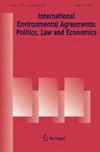Exploring the links between climate transparency and mitigation policy through a reflexive capacity lens: case studies of Brazil, China, India, Indonesia, and Mexico
IF 3.1
3区 社会学
Q1 ECONOMICS
International Environmental Agreements-Politics Law and Economics
Pub Date : 2023-10-17
DOI:10.1007/s10784-023-09618-6
引用次数: 0
Abstract
Abstract As the multilateral climate transparency mechanism increasingly blurs the differentiation between developed and developing countries, it catalyses international pressure on the latter to adopt more ambitious mitigation policies and stringent reporting. This article delves into the relationship between the International Consultation and Analysis (ICA), a climate transparency mechanism under the United Nations Framework Convention on Climate Change (UNFCCC), and the mitigation policies of emerging economies, namely Brazil, China, India, Indonesia, and Mexico. Using the conceptual framework of reflexive capacity, we explore how the ICA enhances the ability of these countries' governments to recognize, reflect upon, and respond to demands for mitigation information. Our research draws on interviews with key government officials, UNFCCC personnel, and experts involved in the ICA process, participant observation, and extensive analysis of primary documents including the Biennial Update Reports, Technical Analysis Synthesis Reports, and countryspecific submissions. The findings demonstrate that the ICA fosters the enhancement of government actors’ reflexive capacities by furthering their understanding of transparency’s significance, advancing their technical reporting expertise, and subjecting individual country performance to scrutiny. Such capacities not only lead to improvements in domestic practices related to the generation and disclosure of mitigation-related information but also empower these countries to assert their entitlement to differentiated responsibilities in the face of increasing demands for mitigation and reporting. The enhanced reflexive capacity and heightened scrutiny are anticipated to play pivotal role in facilitating the development of more ambitious mitigation policies and more effective climate transparency mechanisms at both domestic and global levels.通过自反性能力视角探索气候透明度与减缓政策之间的联系:巴西、中国、印度、印度尼西亚和墨西哥的案例研究
随着多边气候透明度机制日益模糊发达国家和发展中国家之间的区别,它促使国际社会对后者施加压力,要求后者采取更有雄心的减缓政策和更严格的报告。本文探讨了《联合国气候变化框架公约》(UNFCCC)下的气候透明度机制——国际磋商与分析(ICA)与新兴经济体(巴西、中国、印度、印度尼西亚和墨西哥)的减缓政策之间的关系。利用反思性能力的概念框架,我们探讨了ICA如何提高这些国家政府认识、反思和响应缓解信息需求的能力。我们的研究基于对主要政府官员、《联合国气候变化框架公约》工作人员和参与ICA进程的专家的访谈、参与性观察以及对主要文件的广泛分析,包括两年期更新报告、技术分析综合报告和各国具体提交的文件。研究结果表明,ICA促进了政府行为者对透明度重要性的理解,提高了他们的技术报告专业知识,并对个别国家的绩效进行了审查,从而促进了政府行为者反思能力的提高。这种能力不仅可以改善与产生和披露与缓解有关的信息有关的国内做法,而且还使这些国家能够在面对日益增加的缓解和报告需求时,主张其有权承担不同的责任。预期增强的反思能力和加强的审查将在促进制定更有雄心的缓解政策和在国内和全球两级更有效的气候透明度机制方面发挥关键作用。
本文章由计算机程序翻译,如有差异,请以英文原文为准。
求助全文
约1分钟内获得全文
求助全文
来源期刊
CiteScore
6.00
自引率
26.50%
发文量
31
期刊介绍:
International Environmental Agreements: Politics, Law and Economics is a peer-reviewed, multi-disciplinary journal that focuses on the theoretical, methodological and practical dimensions of achieving cooperative solutions to international environmental problems. The journal, which is published four times each year, emphasizes both formal legal agreements (such as multilateral treaties) and less formal cooperative mechanisms (such as ministerial declarations and producer-consumer agreements). The journal''s scope encompasses the full range of environmental and natural resource issues, including (but not limited to) biosafety, biodiversity loss, climate change, desertification, forest conservation, ozone depletion, transboundary pollutant flows, and the management of marine and fresh-water resources. The editors welcome contributions that consider stakeholder initiatives and the role of civil society in the definition and resolution of environmental conflicts. The journal provides a forum on the role of political, economic, and legal considerations in the negotiation and implementation of effective governance strategies. Special emphasis is attached to the following substantive domains: The normative aspects and political economy of treaty negotiations and multilateral agreements, including equity considerations; Methodologies for evaluating the effectiveness of alternative governance mechanisms; The role of stakeholder initiatives and civil society in the definition and resolution of environmental conflicts; The harmonization of environmental strategies with prevailing social, political, and economic institutions.

 求助内容:
求助内容: 应助结果提醒方式:
应助结果提醒方式:


